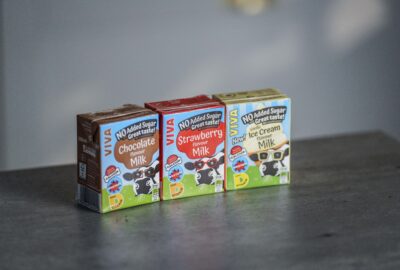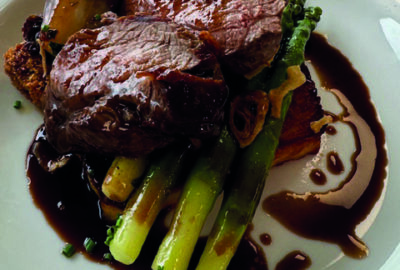You won Birmingham’s first ever Michelin star. Does that make you Brummie royalty?
Of course it does. I have been called the Prince of Birmingham. I’m not sure who the King of Birmingham is, though…
How would you describe the Birmingham restaurant scene?
There are now five Michelin stars in the city, which means that we are officially a five-star city, and that we now have more Michelin starred restaurants than any other city outside London. The city is thriving. We could do with a few more independent restaurants rather than the ever-increasing amount of chain restaurants, but otherwise it’s all very good.
You trained with Gordon Ramsay, Claude Bosi and Gary Rhodes. Which chef influenced you the most and why?
Claude Bosi influenced me the most with his style of cooking. It’s very unique and very audacious. He taught me to go with how I feel rather than being a generic cook. I guess he taught me how to express myself and be individual. I learned from him that it was fine for me to cook what I wanted to cook, and how to stand out from the crowd.
Your website describes your style of cooking as “bold and innovative”. Could you expand further on what you mean by this?
I don’t like to use the word, but people call it quirky! It has a serious edge, but also a quirkiness to it. You know it’s my food. If you put it in front of someone, they would know it is Glynn Purnell’s dish..you’d be able to pick it out of a line up! Not many chefs can say that.
What are the challenges of outside catering?
Outside catering is challenging. It’s got easier over the years thanks to the standard of equipment that is now more portable, and the way we do things. However, I remember a few years ago I was boiling new potatoes for a wedding in an outside environment in the middle of nowhere, and I had nowhere to refresh the potatoes in cold water, so I found a child’s paddling pool, cleaned it out, tipped the potatoes into it and refreshed them with a hosepipe! They were absolutely delicious once they were rolled in butter and re-steamed.
You won Great British Menu twice before becoming a mentor on the programme. What can the UK’s leading chefs do better to nurture future talent in the industry?
The Great British Menu was a great vehicle for me, but by the time I competed in it I was already a trained craftsman, and I’d already won a Michelin star. So, the programme wasn’t the be all and end all for me. I think that some chefs who want to get on in the industry think that by going on The Great British Menu they are going to win it and it’s going to project them in to fame. You’ve got to learn before you earn. You’ve got to learn your craft before you leap into the world of TV. Otherwise, it’s non-sustainable.
Tell us about your involvement in LACA’s Host a School Chef programme and why you chose to support it.
I bring some of the school chefs into my kitchen, which is great for my team as well as the school chefs. It’s great to put the school chefs in an environment where they can see fresh great produce coming through the door and how we deal with it at Purnell’s, and hopefully that will transport into the kitchens across the schools. It is so important for children to eat healthily, to try new foods and tastes. Schools and school chefs play such an important part in delivering this. They are the unsung heroes of the catering world.
1. What are your three kitchen secrets?
Firstly, how to deal with root ginger! The best thing to do is peel it, cut it in to three nice big pieces, wrap it in cling film, stick it in the freezer, and you can just grate bits off as and when you need it. You can’t tell the difference. Secondly, always take meat out of the fridge a while before you cook it. Make sure you start cooking it when it’s at room temperature. You get a far more accurate cooking degree.
Thirdly, eggs don’t need to be kept in the fridge. What you do need to remember about eggs is that they are porous. They take on other flavours. This can be useful when you want an egg to take on flavour, say for example if you are doing an egg fried rice or a truffled scrambled egg.
2. What is your favourite ingredient and why?
My favourite ingredient is an egg! You give me an egg and I can make anything. Whether it be breakfast, a cake, omelette, pancakes, Yorkshire puddings… eggs are incredibly versatile.
3. Please could you share your favourite recipe, along with your reasons for choosing it?
I’m very happy to share the recipe for my Great British Menu winning Monkfish Masala. It’s a completely timeless dish. It’s still as relevant now as it was when it won 10 years ago. It’s still on the menu at Purnell’s now, and it probably will be forever!



